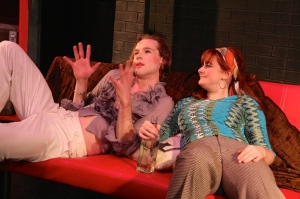 This review was originally written for The Public Reviews: http://www.thepublicreviews.com
This review was originally written for The Public Reviews: http://www.thepublicreviews.com
Taking its title from an apocalyptic Bob Dylan song, this new full-length play itself depicts the end of a world – a rotten one of prejudice, deceit and corruption – but, unlike Dylan’s song, it also leads to the hope of a new dawn and a better world. The action centres around a seedy, illicit gay bar in Greenwich Village, just a few blocks from its rival, The Stonewall and the time is 1969 during the weeks leading up to the historic riots. Images of Britain in the Sixties are largely positive, but, in America, it was a decade of traumas, dominated by assassinations of prominent figures and the horrific Vietnam war. This play is set at a time when Britain had already made the crucial legislative breakthrough in establishing gay rights, with America lagging behind, and the characters speak of London as a kind of nirvana. Giving a bravura performance, Michael Edwards plays Ruby, a brazen cross dresser with a strong Southern accent; a Vietnam veteran, he is aggressive yet damaged, part Rambo, part Blanche DuBois, defiant and unapologetic. He is at his best when spitting out bitchy wisecracks and going into battle to further his beliefs, but his ill-fated relationship with Josh (Oliver Lynes), a young, suited Wall Street type, is less convincing. Bartender Angie, played touchingly by Stephanie Wilson, is a single mother who becomes romantically involved with Danny (Rhys Jennings), an earnest but misguided cop; he belongs to a corrupt force which regards the Mafia and “queers” as posing equal threats. The bar is owned by the Mob, as was the Stonewall, and it is run by Frank (Nigel Barber), who takes under his malevolent wing Jimmy (James El-Sharawy giving a particularly confident performance), an abused, cheeky 16-year-old street boy. Linking together several stories involving unorthodox characters who live on the outer margins of society, the play seems rather like an East Coast equivalent to the works of Armistead Maupin. There are times when a stronger central narrative thread could have helped to hold the separate strands together and to propel the play with a greater sense of purpose towards the climactic Stonewall Riots. Nonetheless, the writing of Jon Bradfield and Martin Hooper, who were previously best known for creating risqué pantomimes for this venue, is admirable. Leaving aside the presence of a “dame”, nothing here remotely resembles a pantomime; this is real human drama, with fleshed-out characters, natural dialogue and a keen sense of history. Viewed from an era when more liberal views prevail, A Hard Rain gives us a stark reminder of how the suppression of a minority group can nurture crime and ruin lives. Having conjured up this production from limited resources, Above the Stag is entitled to feel very proud of it.
Performance date: 28 February 2014
